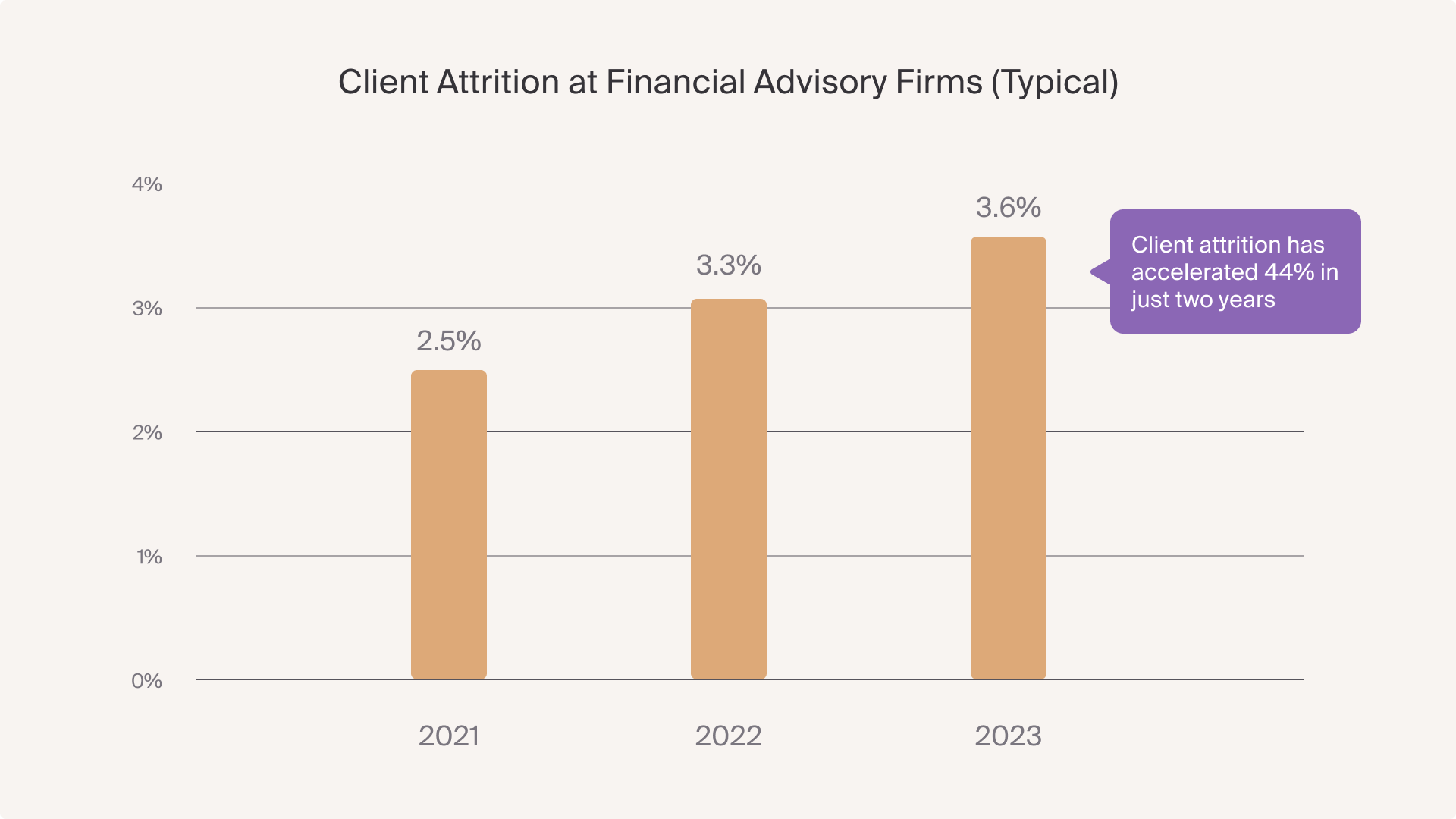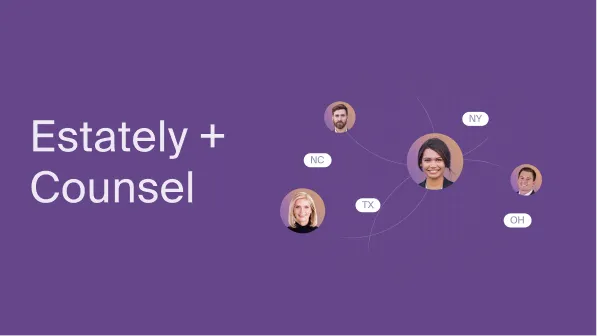Over the next 24 years, roughly $124 trillion in U.S. household wealth will be transferred to the next generation, either directly to heirs or to charities. Unless you are already nurturing strong relationships with clients’ heirs, and advising the whole family on critical estate planning matters, your AUM retention strategy could be at risk.
Many financial advisors have been slow to adapt.
Traditionally, financial advisors have been hesitant to provide estate planning services. The usual practice is to refer clients to outside estate planning attorneys. But strategically, this is a mistake. Advisors who offer estate planning services have the inside track when it comes to retaining their clients’ AUM even after probate, and bringing on clients’ adult children as new clients in their own rite.
This article will demonstrate that affluent and high-net-worth clients increasingly expect estate planning services from their financial advisors, and how you can better serve these clients with minimal added risk–– protecting your AUM against competitors, and even growing your practice with new clients.
“More than 85% of clients surveyed said they expected estate planning services from their financial advisors.
But less than half of them felt they were receiving those services from their current advisors.”
Source: Spectrum Group, 2022.
The Estate Planning Service Gap
For years, financial advice and estate planning have been largely separate processes. Clients would go to one person for investment advice, and to another practice altogether for estate planning services.
Those days are over. More comprehensive planning services have become the norm. Today, clients expect their financial advisors to help with estate planning. Increasingly, they demand it.
And by and large, they aren’t getting it.
Advisors who don’t include at least basic estate planning services in their scope of work are being increasingly perceived as undeserving their clients. For example, A 2022 survey from the Spectrem Group found that more than 85% of clients surveyed said they expected estate planning services from their financial advisors.
But less than half of them felt they were receiving those services from their current advisors.
If you aren’t talking to your clients about estate planning, you’re leaving the door wide open to a competing advisor who will.
And if you aren’t taking the opportunity to connect with future generations of your clients’ family as a trusted family advisor, don’t worry, someone else will.
And eventually, you’ll start to hemorrhage AUM as a result.
That’s a big, flashing warning signal for your practice. In fact, we’re already seeing signs of increased AUM attrition as Baby Boomers age: AUL attrition (“churn”) at financial advisory firms nationwide hit 3.6% in 2023––an increase of 44% over just two years, according to a 2024 study from The Ensemble Practice.

What Do Clients Want?
The old days of going to completely separate advisors for financial planning and estate planning are over. Clients don’t want to go to different people for investments, insurance, and estate planning services. Instead, the financial planning community has conditioned clients to expect comprehensive financial planning services.
For example, the CFP Board has long included estate planning in the core financial planning curriculum. And their marketing has been hugely successful at differentiating certified financial planners against other investment advisors by promising estate planning as part of that comprehensive mix.
Here’s what clients are looking for:
- 37% want education on estate planning concepts.
- 41% want their advisors to get their hands dirty by helping with details with beneficiary designations and recommending tax strategies.
- 35% expect financial advisors to deliver a full, comprehensive estate plan, complete with document preparation.
- 33% ongoing estate planning services and support from their advisors.
Guardrails: How Estate Planning Software Helps Keep Advisors Compliant
These dynamics aren’t exactly new.
For decades, many financial advisors, including investment advisors and insurance professionals, have avoided getting directly involved in estate planning.
The reason: Fear.
Estate planning was viewed as the exclusive domain of licensed attorneys. Other financial professionals didn’t want to risk being accused of unlicensed practice of law, or UPL. But modern estate planning software for advisors protect you by embedding compliance guardrails directly into the process.
For example:
- Client-directed data entry. Clients completing their own documents creates a legal barrier for the advisor. With client led workflows, advisors can offer estate planning documents without providing legal advice.
- Locked templates. Advisors can’t edit legal language or provisions. Solutions that offer locked templates ensure that drafting is left to the attorneys while advisors can still offering estate planning safely.
- Attorney Drafted Documents. Every document and template is drafted by attorneys and reviewed for compliance with state law.
- Lifetime Access to Documents. Securely store documents with lifetime access to ensure a smooth process for estate planning reviews or execution.
Software empowers advisors to offer estate planning while maintaining a strict separation between financial and legal advice. As a non-attorney advisor, it is important to stay in your own lane, providing education and coordination. But you don’t need to offer legal advice or engage in the unlicensed practice of law to offer estate planning if you have the proper tech stack.
And of course you can always involve an attorney as needed when special cases arise.
How Estate Planning Software Helps Advisors Business Growth
By extending your services to include estate planning, you can grow your business in multiple ways:
First, competing firms are constantly looking to get your clients to defect, and take your AUM with them. When you offer estate planning services, you deny competitors the opportunity to use estate planning to drive a wedge between you and your clients. You can break the attrition cycle, and keep AUM from leaking of your business to competitors.
Second, estate planning provides a natural mechanism for you to engage not only with your client, but with the client’s heirs, as well. These relationships mean the AUM is more likely to stick with you after your client passes on. And you have the opportunity to onboard the heirs themselves as clients in their own right, with their own assets.
Estate planning enables you to help clients organize, visualize, and manage their estates more effectively—positioning you as the central advisor for all aspects of their wealth. By expanding into estate planning, you strengthen relationships, capture new revenue opportunities, and ultimately increase assets under management.
You also gain deeper visibility into your clients’ total financial picture, making it easier to identify unmanaged accounts, consolidate assets, uncover new investment opportunities, and ensure portfolios are structured for long-term success.
And, of course, the heirs will have estate planning needs of their own. So you can start building a relationship with your original client's grandchildren and great-grandchildren.
44% of advisors who offer estate planning as a prominent value-add say it led directly to increased AUM from current clients. And 42% say it brought in entirely new clients.
7% of advisors attribute AUM increases “specifically and directly” to adding estate planning services.
This isn’t a “someday in the future” thing. The future is now.
24 percent of advisory firms have already adopted estate planning software, according to Kitces.com. That number will nearly double to 46% by the end of next year.
So if you aren’t offering the estate planning services your clients demand, there are other firms in your area that are––and that are actively marketing to your clients and their families.
Advisory practices that continue to isolate themselves from estate planning are becoming obsolete.
Estate planning is no longer a side topic that you can simply refer out to an attorney the client and their family doesn’t know. It's now a core financial planning conversation.
Clients expect it. Technology now makes it simple to deliver. And advisors who embrace it are already seeing the payoff.
As the saying goes, “it wasn’t raining when Noah built the Ark.”
The time to start building relationships with the next generation of your clients’ families is now. Before the assets start to move.
When you integrate estate planning into your financial advisory business model, you're giving yourself a reason to sit down with spouses, children, and even grandchildren long before assets start to move. That’s where real continuity — and real long-term AUM retention — begins.
Next Steps for Financial Advisors
Ready to add estate planning to your practice? Explore how Estately helps financial advisors deliver compliant, client-friendly estate planning services.




